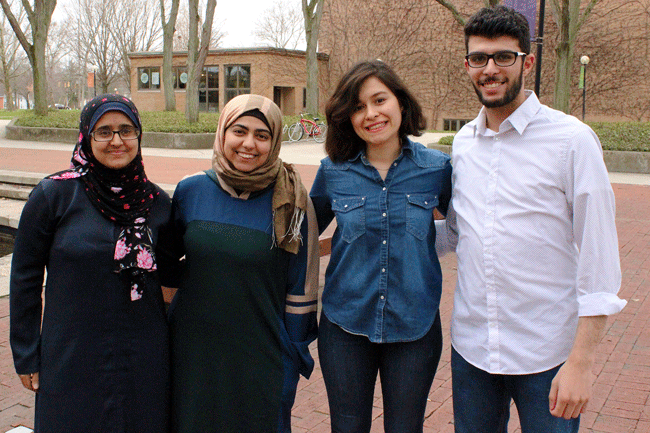Every morning, Sara Azzuni, wakes up before the sun rises. After pinning a brightly colored hijab around her face, Azzuni kneels toward Mecca – which in this case, is toward the door of her dorm room in Yoder hall.
Azzuni, a second-year nursing major from Palestine, is one of five Muslim students who attend Goshen College, which is a Mennonite-affiliated school. Other students include Nasim Rasoulipour, Yazan Meqbil, Alhassan Barrie and Ameera Alshuga. According to Bob Yoder, campus pastor, 85.1 percent of Goshen College students identify as Christians, and only 1.8 percent identify as “non-Christian” faith groups, such as agnostic, Buddhist, Hindu, Islam, etc.During Azzuni’s first year at Goshen College, she was the only Muslim that she knew of on campus. Although she wasn’t lonely, she now finds community with other new students on campus who share her faith.
Azzuni has especially found community with Ameera Alshuga, a first-year biochemistry student from Yemen, who also wears the hijab.
“Whenever Ameera, the other hijabi girl, talks, I’m really proud that there’s another voice, another person who’s really helping,” Azzuni said. “I’m so proud that there are other people who are really helping and giving Islam a real voice – not the one in [the] media…. It is definitely nice to have [other Muslim students]. We don’t get together much, because we’re all busy with our lives and stuff… but it’s nice to know that there are other Islamic voices around campus.”
One of the new students is Yazan Meqbil, a second-year transfer student from Palestine who won Goshen College’s annual C. Henry Smith Peace Oratorical Contest in February. Meqbil’s speech focused on his identity as a Muslim man in the United States.
Meqbil considers himself to be, “90 percent Muslim, 10 percent just a little extra from other faiths.”
Meqbil prays a few times a day – after he wakes up, before eating, after eating. Meqbil noted that some may think that because he doesn’t pray five times a day, he is a “bad Muslim.”
“For me personally, sometimes I think it’s a problem,” he said. “But I still have a connection with God. Not necessarily through formal prayers, but through my own connection with God.”
For Azzuni, a typical day involves a lot of prayer. Throughout the day, she prays five times.
“I’ve pretty much prayed in every room on campus,” Azzuni said. “My bedroom, Kulp basement, Church Chapel – I pray everywhere.”
To stay on top of her prayers, she uses an app called Muslim Pros which alerts her of when she should pray, as well as which way she should kneel so that she faces Mecca, toward the east.
Nasim Rasoulipour, a first-year student from Iran, is also Muslim.
Instead of praying at specific times throughout the day, Rasoulipour chooses to pray when she feels she needs to.
“I’m a Muslim, but I don’t practice it in the usual way,” she said.
Rasoulipour, who has spent a lot of time in the United States, opts to go without the hijab. Instead, dark brown curls hang right above her shoulders.
Rasoulipour mentioned how her life is easier due to going without the hijab.
“The hijab has been viewed as very bad,” she said. “And it’s really sad. Some people may ask why I don’t wear the hijab if it’s not bad – it’s just a choice that I’ve made. I felt like I’d be more comfortable this way.”
For Muslim students on a Christian campus, life can sometimes be difficult.
Azzuni confessed that sometimes she felt uncomfortable because of her outward expression of faith. She said a frustration of attending a predominately Christian college was all of the looks she received due to her hijab. However, after getting used to it, she doesn’t mind as much anymore. In fact, she appreciates the opportunity to educate her peers about her religion.
“It’s good to be different, but sometimes you’re sick of being different,” Azzuni said. “I remember a lot of last year, when people would come up and ask [about my faith], they would apologize for like, 10 minutes before asking the question… and it would turn out to be a very simple question.”
Overall, Azzuni has enjoyed her time at Goshen College. Azzuni has found that by attending a Christian college, her Islamic faith has strengthened.
“When I first came to [Goshen] I was like, ‘Now it’s my choice. Now it’s something I want to do, it’s something I understand,’” she continued.
Meqbil had a similar experience.
“Being at a Christian school helped me regain my faith in my own religion because being at a Christian school, or a Jewish school or whatever religion, it’s more about how you see people are observing God.”




